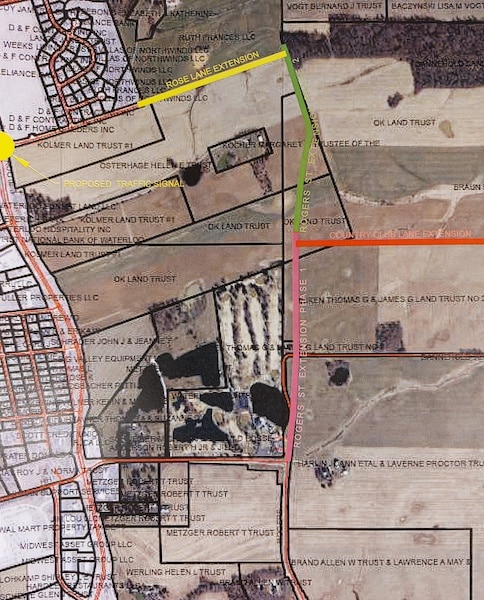Future road extensions take shape

The Monroe County Board took action on future roadway plans during its Monday morning meeting.
Monroe County Engineer Aaron Metzger presented two intergovernmental agreements for commissioners to sign.
The first was with the City of Waterloo for a two-phase extension of Rogers Street, Country Club Lane and Rose Lane that will also establish a new traffic signal on Route 3.
The first phase will extend Rogers Street northward and Country Club Lane westward to create a 90-degree intersection in what is currently farmland just past the northern boundary of the Waterloo Country Club golf course property.
The new intersection would eliminate what have been described as “dangerous” 90-degree turns on the current configuration of Country Club Lane.
Metzger said the project could see construction begin in late 2023 if right-of-way acquisition goes smoothly.
The second phase of the project would extend Rose Lane east-northeast from its current end in the Northwinds subdivision and connect it with a second northward extension of Rogers Lane from its new intersection with the planned Country Club Lane extension.
A traffic signal is proposed at the intersection of Rose Lane and Route 3 just south of Dobbs Tire & Auto Centers in Waterloo when construction of the second phase is complete.
Metzger estimated work on the second phase would begin no earlier than the second half of 2026.
Total cost for both phases of the project is currently estimated to be close to $4.9 million. $1 million of the second phase will be covered through a federal grant. Waterloo and Monroe County will equally divide the remaining costs for both phases.
The City of Waterloo is expected to sign the agreement at a future meeting.
The other intergovernmental agreement was with the Village of Valmeyer for a resurfacing project of a section of streets within the village that connect Route 156 in the south to Bluff Road in the north side of town.
The Valmeyer Village Board approved the agreement at a January meeting.
Monroe County Board Chairman Dennis Knobloch abstained from the vote due to his involvement with Valmeyer as its village administrator, an appointed position.
Metzger also mentioned the recent passing of Carl Vogt, who had been a commissioner for Road District 3 from 1997-2009.
“Carl was a good one,” Metzger said.
Earlier in the meeting, Monroe County Sheriff Neal Rohlfing addressed commissioners with a request to raise starting pay for part-time deputies to $18 per hour.
Rohlfing explained that only one person would be affected by the change, but also there had been no official changes to the part-time rate since it was increased to $15 in 2015.
Rohlfing said the change was needed in light of upcoming minimum wage increases nationally, and more so in Illinois.
He went on to say that things have changed drastically with the law enforcement employment trends.
Rohlfing reported that the Monroe County Sheriff’s Department used to receive several applications per week. They now receive the same amount per month.
“Things have changed drastically … especially since 2014,” adding that he felt state politicians’ and national media’s recent portrayal of law enforcement has “decimated the profession.”
Law enforcement is “going to see some major problems, I project, in the next 5-7 years,” Rohlfing continued. “I don’t see anything getting fixed.”
He also pointed out that in 2023 cash bail will be eliminated, predicting the policy will be “an absolute disaster.”
“I can’t fix (the problems), all I can do is come to (commissioners) to try and incentivize and get people to apply” for law enforcement positions, the sheriff said.
Rohlfing concluded by thanking commissioners, saying the sheriff’s department would not have been getting the applications it had been getting without the county board’s support.
Commissioners voted to increase the starting minimum wage for part-time deputies.

The newest administrator for the county-owned Oak Hill senior living and rehabilitation center in Waterloo was introduced during Monday’s meeting.
Shari Kruep began as administrator of Oak Hill on Feb. 2, bringing 30 years of senior living facility administration experience. She most recently served in that role at a St. Louis facility.
Kruep replaces Kim Keckritz as administrator. Keckritz has moved to a part-time role as an administrative support coordinator.
Kruep is not new to Oak Hill, though. She was the administrator at Oak Hill (then Monroe County Nursing Home) in 2001 before accepting a position at a different facility, at which time Keckritz took over for Kruep.
Read more about Kruep’s journey back to Oak Hill and her plans for its future in an upcoming issue of the Republic-Times.
At the end of the meeting, commissioners heard two requests for flood plain construction variances.
The first was for construction of a 36-by-80-foot shed to replace an existing shed near Lagoon Road in old Valmeyer.
Property owner Eric Knaust told commissioners it would be more cost effective to rebuild the shed rather than fix the roof and other repairs. He added that the new shed would occupy the exact footprint as the old shed.
The Monroe County Zoning Board of Appeals had voted unanimously against the variance. Knaust said he was not in attendance to plead his case at that meeting because he was experiencing flu-like symptoms.
Knobloch asked if the structure was being used for any agricultural purpose. Knaust responded it was not and he wanted to repair it mostly to enhance the appearance of the area. He said the building held mostly sentimental value for him, as it once belonged to his father.
Knobloch explained Federal Emergency Management Agency requirements are very strict involving new construction in a floodplain – especially if it is not for ag use.
The board voted 2-1 to deny the variance after asking Knaust if he would be interested in building a more expensive structure that would meet FEMA flood mitigation requirements.
Knaust said he would just repair the roof, which he can do without board approval, and leave the rest of the building as-is.
Commissioner Vicki Koerber voted against denying the variance.
The second variance request was originally for construction of lean-tos on an existing structure near Merrimac Road between Valmeyer and Columbia.
The owner of the property, who also does work for the Columbia Drainage & Levee District, wanted to build the additions to have a place to store and work on equipment and machinery.
Levee district Brian Mehrtens was on hand to support the variance, explaining it would be a help to have another, more convenient, storage location for levee work.
After discussion, no action was taken on the request.
Knobloch speculated the lean-tos would be converted into an enclosed structure, and he asked if the property owner would be willing to build a flood-proof structure instead since it appeared likely that would be the eventual outcome.
The owner agreed to work with Monroe County Zoning and Building Administrator Chris Voelker on drafting a new plan for submission.
The next meeting will be at 8:15 a.m. Feb. 22 at the Monroe County Courthouse.






